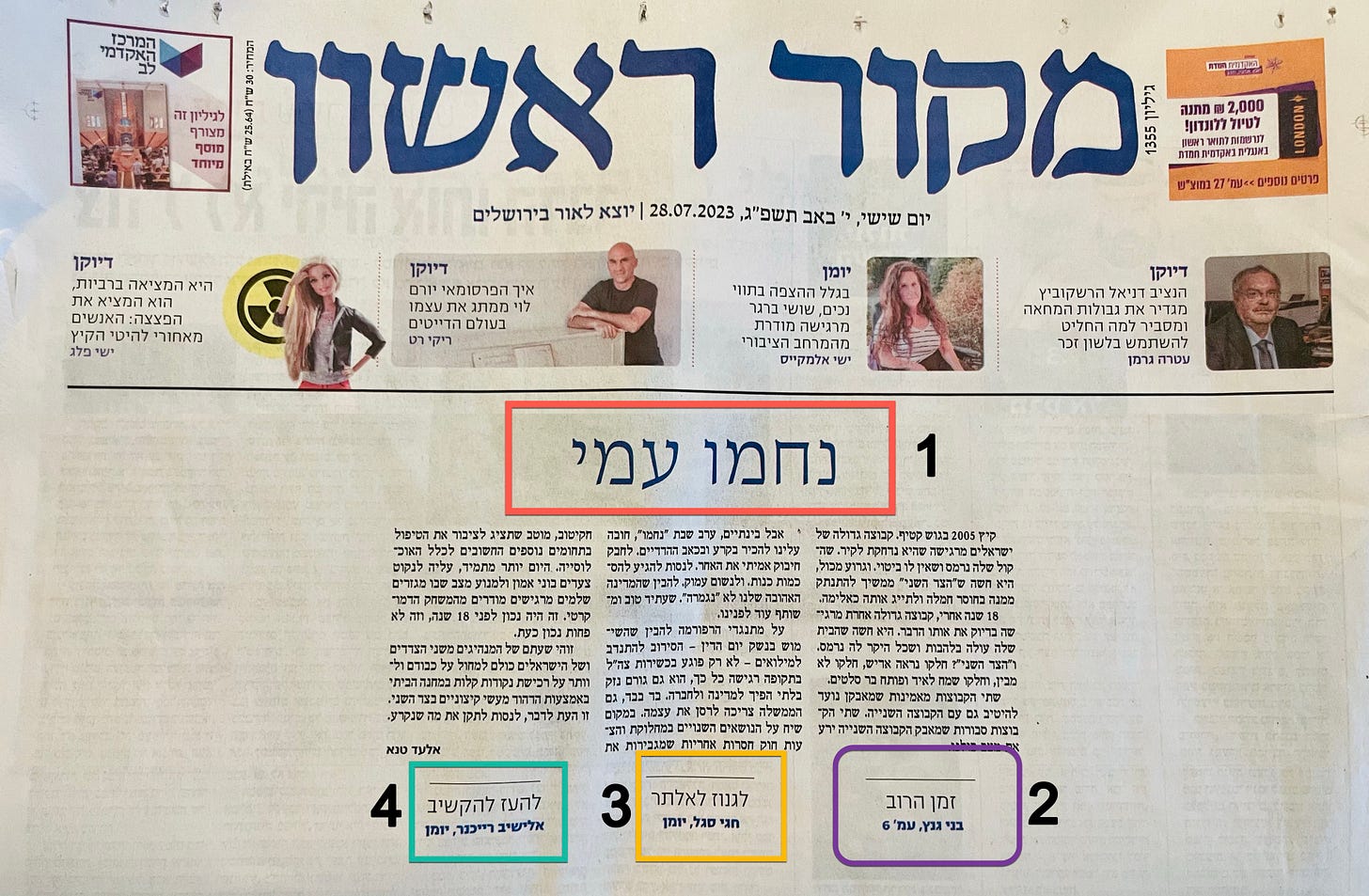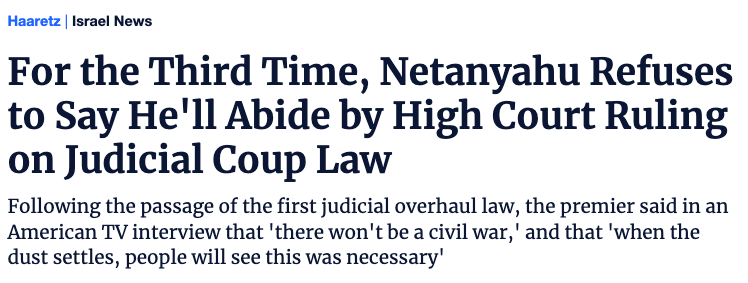
We woke up on Sunday morning to a text from our kids that our newest granddaughter had been born in Tel Aviv a few hours earlier. Needless to say, later that afternoon, we were at the hospital, in her mother’s room, with the baby all wrapped up, sleeping in the bassinet.
Our daughter-in-law and son were each dealing with stuff, so in the room it was just the baby, Elisheva (my wife) and our mechutan (our daughter-in-law’s father). He’s a really great guy (actually a Phantom fighter pilot back when he was younger, for those who like things straight out of central casting), and he and I chatted for a bit. All the standard stuff: she’s so adorable, you forget how little they are when they’re born, thank G-d the delivery went so smoothly … all of that.
Then it was quiet, and we both just watched the baby breathe—until he punctured the silence. “What an utter disaster we’re leaving her generation …. and for what? For absolutely no reason. Just because people had no hesitation about destroying the whole thing.”
So much for talking about the newborn baby.
A few hours later, we were in the car, headed back to Jerusalem. If you don’t pick the right time, the drive is horrible, with the traffic on the Ayalon Highway in Tel Aviv bumper to bumper, seemingly endless. And we had not picked the right time (which we knew)—Waze said the drive was going to take about twice as long as it usually does. But the good news about the snail’s pace was that I was able to take a quick shot of the building site along the highway pictured at the top of this page. It’s a project being built by the construction company named Tidhar (you can see their name on the bottom left of the enormous canvas sign)—but what mattered much more was the text of the sign:
“Let’s not destroy everything that we’ve built. We have to solve this together!”
It was a clever pitch for a construction company, an opportunity to get their name onto people’s cameras at this unique moment in Israeli history. But the more important point was, of course, that everyone understood precisely what the sign is referring to: what we’ve built, what we’re destroying, how whatever we are is the very opposite of “together.”
It’s hard to know how to best capture the mood of a country. So below, I’ve taken two of the front pages of the country’s leading papers that were published this past Friday, Yedi’ot Ahronot (center/left) and Makor Rishon (religious/right). Given that the papers are delivered before we wake up on Friday morning, it’s safe to say that they’re laid out sometime on Thursday, which was about three days after last week’s vote in the Knesset. (Because colors are a bit difficult for some readers, I’ve both colored and numbered the relevant sections discussed below.)
Here’s a quick glimpse at what the country was reading in Yedi’ot, the country’s best-selling (not-free) paper:
The main headline, #9, is the most important. We’ll get to it below.
Article about the group “Brothers in Arms,” one of the key groups of veterans who have been fighting the reforms. “Carriers of the Flag,” reads the headline in the light green frame. The smaller sub-headline reads: “The activities and the secret meetings.” The text of the article, in one of the weekend supplements, was about how they have only just begun to fight, and what is still in their arsenal of plans. [Anyone who was an officer in the IDF has a legal right, by definition, to have a gun license in Israel. Several of the leaders of “Brothers in Arms” have had their licenses revoked with no explanation—so far, they’re not fighting it, but, they say, “big brother” is already here.]
A column by Nadav Eyal (in the light red frame to the right), one of Israel’s most highly regarded columnists (whom we’ve interviewed on our podcast), called “A Government Completely Out of Touch.”
In the yellow/green frame, a column by Sima Kadmon, “He’s Not Fit.” There is a raging debate as to whether Netanyahu is mentally fit to be Prime Minister. Even before his heart episodes in the past week, many people have noticed that this isn’t the old Bibi. What the real story is, of course, no one is saying.
In the light blue frame, also on the right, a column by Amit Segal, also a well-regarded and widely-read columnist, called “The ‘own-goal’ of the right.” [“own-goal” is when you kick the ball into your own goal, thus scoring for the other team] There are many people, both among those who support the “right” and those who don’t, who argue that what is happening now will ultimately be seen as the beginning of the end of the right’s hegemony. If the Second Intifada proved that the left had no vision and ended its rule for several decades, the argument goes, this will prove that the right had a rudimentary vision, but had no statesmen and no skills at governing, and what we’re witnessing is the beginning of their end. You hear that argument everywhere here, but it’s hard to know if it’s correct.
In the purple frame at the very bottom, a column by Ben-Dror Yemini, one of the old guard of Israel’s venerated columnists, with the title, “The damage is already done.”
Nahum Barnea (in the green frame on the left), another veteran columnist, on how Gallant is trying to get the Likud (his own party) to join a national unity government, with Gantz and Lapid.
“The American Conditions”: normalization with Saudi Arabia in exchange for major concessions with the Palestinians. The Israeli right, of course, is opposed to any such concessions and doesn’t care that much about Bibi’s lately vaunted train line to Riyadh. Hard to see that deal going anywhere ….unless Bibi decides that he wants it for his now irrevocably stained legacy, in which case he might choose to dump his right and go for the national unity government suggested in #6 above?
Yedidah Stern and Raz Nazri arguing that the Supreme Court’s deciding to overturn the new law passed by the Knesset would be a huge mistake.
Here’s the main headline on the newspaper front page above:
Military Intelligence warning to Netanyahu: Our Enemies Detect a Historic Moment of Israeli weakness.
In the days that followed, other sources went further. This next headline from N12 reads: “Top Echelons of the IDF: Our Enemies See an Opportunity to Attack Israel.”

Or this one from Ha’aretz yesterday, which requires no explanation.
Standard and Poor: The Judicial Reform is endangering Israel’s economy.
Well, one might say, that’s to be expected from a paper that’s a bit left of center. Maybe. What about the right? Here’s a quick look at Makor Rishon, from the same day.
This past Shabbat is called “Shabbat Nachamu,” the Shabbat of Consolation,” as it’s the Shabbat after Tisha B’Av. The word “nachamu” is taken from the Haftarah recited that morning, from Isaiah 40:1 — “Comfort, O Comfort, My People, says your God.”
The main article on the front page, an editorial, begins this way:
In the summer of 2005 in Gush Katif [DG—in Gaza, right at the time of the Disengagement], a large group of Israelis feels that it is being pushed to the wall. That its voice is being silenced, and that it has no way of expressing itself. And worst of all, the group feels that the “other” side continues to distance itself from the group with no sense of compassion, and to describe it as violent.
Eighteen years later, another large group feels exactly the same thing. It feels that its home is going up in flames and that everything that matters to it is being destroyed. And “the other side”? Part of it seems apathetic, part seems not to understand, and part seems to delight in the other’s misfortune and is keen to open the salad bar [DG—a dig at Ben Gvir, explained here.]
The same editorial ends this way:
This is the hour for leaders on both sides and for Israelis as a whole to give up worrying about their honor and to stop scoring easy points for their side by pointing to extremist steps on the other side. This is the time to talk, to try to fix what has already been torn asunder.
Then there are the numbered headlines above:
The editorial above, with the headline, “Comfort my people,” a play on the verse from Isaiah.
A column by Benny Gantz (yes, on the front page of the right wing paper), entitled “The Time of the Majority”
A column by Haggai Segal, usually pretty stridently right wing, entitled “Table it immediately”, referring to the judicial reform legislation.
And a column by Elyashiv Reichner, pretty hard core right, “This is the time to listen.”
There’s much more to say about these papers, but this column is long already. Suffice it to say, these papers do not believe that what Israel just experienced was a fabulous moment of civic discourse. These are papers warning their readers that their country is coming apart at the seams.
The headlines since then haven’t been much better. In September, the Supreme Court will hear the case about the new legislation with the full cohort of 15 justices, something that has never happened before in Israel’s history. If the court rules that the legislation is illegitimate, will the Prime Minister abide by the ruling of the most senior court in the land? And if he doesn’t, does Israel even have a Supreme Court worth its name? And if it doesn’t, what kind of democracy is this? (Note, by the way, that Bibi gave the interview to “American TV” — he’s more or less stopped speaking to the Israeli press, as he knows that virtually no one here believes him about anything.)
And while the headlines above pointed to the possibility of attack, there are other ways in which Israel is weak, far beyond the military. Even the UAE (hopefully, you didn’t think that just because they’d signed the Abraham Accords, the Emirates had become Zionists), sees an opportunity to help itself, while adding to Israel’s hemorrhaging:
Why review all this? Why does all this matter?
Because, as I made clear in the video clip at the very top of this posting, which is the conclusion of my discussion with Rabbi Marc Baker of the Combined Jewish Philanthropies of Boston, recorded on Tisha B’Av last Thursday (and which the CJP has graciously agreed to allow us to post), this is not the time to lie about how deeply wounded Israel is. This is a country in deep, deep trouble, and pretending otherwise miseducates American Jews, making any real relationship between us just a pretense.
Now, I fully understand that leading American Jewish organizations (we’ll take AIPAC as an example in this instance, though there are others) believe that if American Jews knew how deep the crisis here is, they might become dejected, they might give up. Or, they say, it’s for members of Congress, not American Jews, that they have to send out messages like this, which they did the day of the vote (Monday), just days before papers above were being “typeset”.
The past few weeks and months have exposed many deep political divisions in Israel.
The ongoing debate about judicial reform has been painful for Israelis and pro-Israel Americans alike who care deeply about the future of the Jewish state.
After delaying many aspects of judicial reform, the Knesset proceeded today to approve a provision that will remove the Supreme Court's authority to determine if a government decision is “reasonable” as part of its considerations. Petitions have already been filed for the court to review if the law is viable – and so this debate will continue.As President Herzog remarked in his speech to Congress last week, “I have great confidence in Israeli democracy. Although we are working through sore issues, just like you, I know our democracy is strong and resilient. Israel has democracy in its DNA.”
The Knesset will soon break for its summer recess, after which more discussions about further changes to Israel's judiciary may be considered – both in the parliament and as President Herzog pursues compromise agreements on additional elements of judicial reform.
On this most serious and important discussion about changes to Israel's democratic institutions, we see a nation deeply engaged in the civic debate. Hundreds of thousands of citizens, both for and against the proposed reforms, have poured into the streets to demonstrate and advocate for the future they wish to shape for their country.
In one video from over the weekend, protesters on opposite sides of a train station escalator (and on opposite sides of the judicial reform debate) can be seen greeting each other warmly with Israeli flags, befitting the familial kinship of the Israeli people.
There are times that one can string together a group of claims that are either true or mostly true, yet paint a picture that is patently false. This is an example of that. Each sentence is either correct, or sort of correct. But the picture that emerges from the above bears no resemblance to the picture of what Israelis, both left and right, are telling themselves about their country. That’s why the newspapers above matter so much.
“The audience wasn’t American Jews, it was Congress,” said my friends (some of whom are among my closest friends, whom I deeply love) who are both professional and lay leaders of the organization. And I know that they really do believe that.
But it’s not entirely true, either. The “message” to that “audience” was sent via AIPAC’s members, who are not Congress, they are American Jews. And many of them believe what AIPAC tells them, usually with very good reason. AIPAC’s leadership is made up of people who love this country, who have devoted decades of their lives to Israel, and who are very, very smart and skilled.
For years, leaders on both sides of the divide have said that we need to heal the fractured relationship between American Jews and Israel. I agree, and wrote a book called We Stand Divided, saying that part of what we needed to do is to start telling the truth to and about each other.
Israel’s papers aren’t lying about how broken we are. Even the construction company with the big sign at the top is being honest about that.
This is a broken, hurting, frightened country. Does that not sit well with some American Jews? I don’t know, but that doesn’t make it less true. Is that what one simply has to tell Congress for them to support us? There, too, I’m no expert, and I don’t know.
But here’s what I do know. Israel is changing right in front of our eyes, and though we have always “sold” Israel to Congress by stressing our shared values, those shared values are disappearing, slipping through our fingers like water in the cups of our hands.
What legislation is being proposed just this week?
Splitting the role of the Attorney General, so she will not be able to prevent the charges against Netanyahu from essentially being dismissed
A law permanently exempting Haredi men from military service
A law that would make it legal for the public to contribute to Bibi’s defense fund
A law that would allow Aryeh Deri, twice convicted of fraud and who has served jail time in the past, to fill any position in the government, which the court has blocked in the past
Death penalty for terrorists (as of now, it has been applied only to Eichmann)
A law that would permit exiling the families of terrorists
A law that would stipulate jail time for inappropriate dress at the Kotel
A law mandating extended jail sentence for those who block roads
A law breaking up the Bar Association (which elected a leader whom Netanyahu opposed)
There’s lots more, but you get the idea.
Shared values? For those of us who make our lives here, what’s happening here is not a PR challenge, it’s a deep fracture in the center of our souls. We’re not thinking about anything else. We’re not sleeping. And if we do fall asleep, we dream about everything falling apart. Ask people here.
Especially now, it would be nice not to be alone. The first step towards that would be to have those who love us and who want to support us let us know that they know exactly how fragile and how dangerous things have become.
Anything else is simply not true—and perhaps even worse, leaves us feeling abandoned when what we need is precisely the opposite.
Impossible Takes Longer is now available on Amazon and Barnes & Noble and at other booksellers.
Our Twitter feed is here; feel free to join there, too.
Our Threads feed is danielgordis. We’ll start to use it more shortly.











